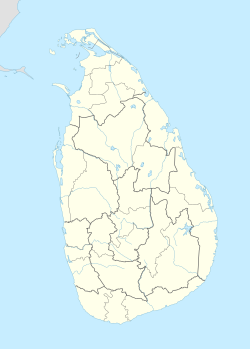Udugampola
Udugampola
උඩුගම්පළ உடுகம்பொல | |
|---|---|
Town | |
| Coordinates: 7°07′32.7″N 79°58′52.8″E / 7.125750°N 79.981333°E | |
| Country | Sri Lanka |
| District | Gampaha District |
| Time zone | UTC+5:30 (SLST) |
| Postal code | 11030 |
| Area code | 033 |
Udugampola is a small town in the Gampaha District of Sri Lanka and was a sub kingdom during reign of the King Sakala Kala Wallabha of Kotte Era.[1] The main point in the area is around the intersection of Gampaha-Minuwangoda and Kotugoda-Naiwala roads.
History
[edit]
According to the historical sources such as the Rajaveliya, Udugampola had been the sub kingdom of a provincial king or viceroy, Sakalakala Wallabha, the son of Veera Parakramabahu VIII of Kotte.[2][3] The place where the palace of the king was located is today known as Maliga Godella (Mound of Palace) and ruins related with the Kingdom are still can be seen at the premises of the present Uththararama Purana Vihara.[4] The large pond called Pathaha Pokuna adjoining the Uththararama temple has been identified as the bathing pool of the king.
The existence of a palace in Udugampola is confirmed by an old copper plate called Kadirana Sannasa which was discovered in Kadirana cinnamon plantation near Negombo town. It bears no date but purports a grant made by king Vijayabhahu of Udugampola in Alutkuru korale. The Sannasa records a donation made to a Brahmin by the king at a royal assembly held in his new palace at Udugampola on new moon day of Poson (18 June 1517) when a full solar eclipse was sighted.[5]
See also
[edit]References
[edit]- ^ "The Kandyan Rebellion". The Sunday Times (Sri Lanka). 21 December 2008. Retrieved 10 May 2017.
- ^ Wijesuriya, Dinithi (2015). "Administration of Udugampola, sub kingdom: A Historical and Archaeological Legacy". University of Kelaniya. Retrieved 10 May 2017.
- ^ Ariyaratne, L. W. (6 October 2012). "Revival of Kotte Period: 'Patha Pokuna'". Daily Mirror. Retrieved 11 May 2017.
- ^ "Cultural background of the Minuwangoda Division". Minuwangoda Urban Council. Retrieved 10 May 2017.
- ^ Royal Asiatic Society of Great Britain and Ireland. Ceylon Branch, Colombo (1873). Journal of the Ceylon Branch of the Royal Asiatic Society. Vol. 5. Colombo Apothecaries Company, 1873. pp. 75, 76, 77.
External links
[edit]

